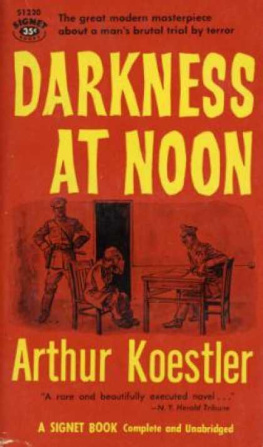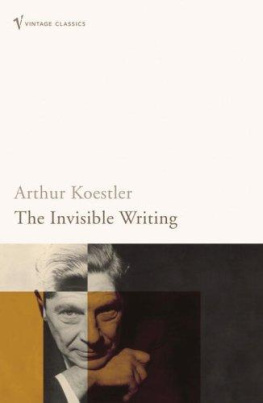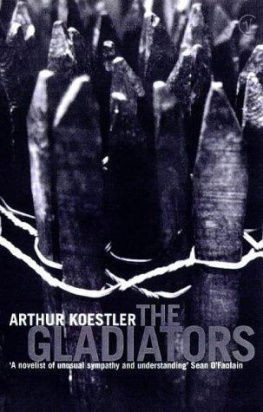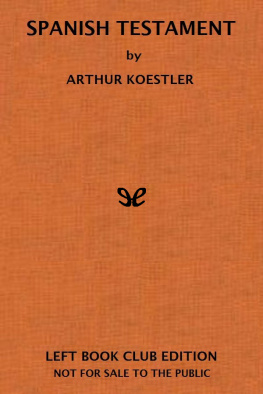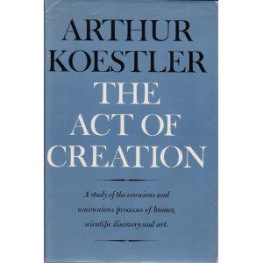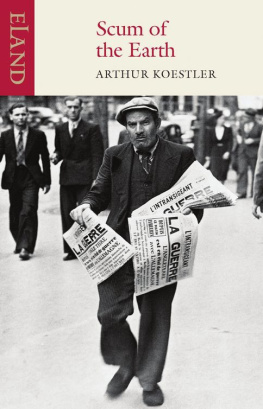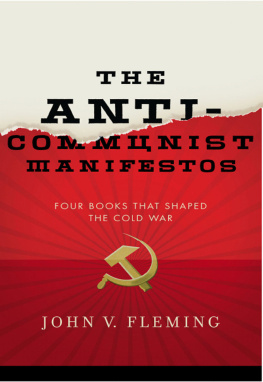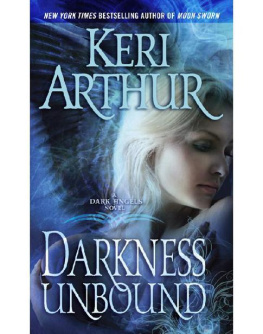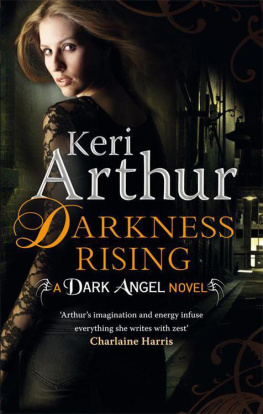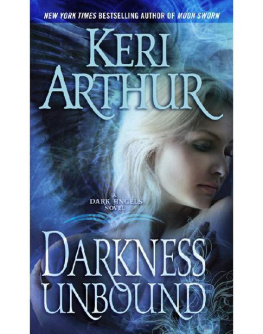Arthur Koestler - Darkness at Noon
Here you can read online Arthur Koestler - Darkness at Noon full text of the book (entire story) in english for free. Download pdf and epub, get meaning, cover and reviews about this ebook. year: 1984, publisher: Bantam, genre: Detective and thriller. Description of the work, (preface) as well as reviews are available. Best literature library LitArk.com created for fans of good reading and offers a wide selection of genres:
Romance novel
Science fiction
Adventure
Detective
Science
History
Home and family
Prose
Art
Politics
Computer
Non-fiction
Religion
Business
Children
Humor
Choose a favorite category and find really read worthwhile books. Enjoy immersion in the world of imagination, feel the emotions of the characters or learn something new for yourself, make an fascinating discovery.
- Book:Darkness at Noon
- Author:
- Publisher:Bantam
- Genre:
- Year:1984
- Rating:3 / 5
- Favourites:Add to favourites
- Your mark:
- 60
- 1
- 2
- 3
- 4
- 5
Darkness at Noon: summary, description and annotation
We offer to read an annotation, description, summary or preface (depends on what the author of the book "Darkness at Noon" wrote himself). If you haven't found the necessary information about the book — write in the comments, we will try to find it.
Darkness at Noon — read online for free the complete book (whole text) full work
Below is the text of the book, divided by pages. System saving the place of the last page read, allows you to conveniently read the book "Darkness at Noon" online for free, without having to search again every time where you left off. Put a bookmark, and you can go to the page where you finished reading at any time.
Font size:
Interval:
Bookmark:
ARTHUR KOESTLER
Born in Budapest In 1905, educated in Vienna, Arthur Koestler early immersed himself in the major ideological and social conflicts of his time. A Communist during the 1930s, and visitor for a time in the Soviet Union, he became disillusioned with the Party and left it in 1938. Later that year in Spain, he was captured by the Fascist forces under Franco, and sentenced to death. Released through the last-minute intervention of the British government, he went to France where, the following year, he again was arrested for his political views. Released again in 1940, he went to England, where he has since made his home. His novels, reportage, autobiographical works, and political and cultural writings have established his worldwide eminence as a commentator on the dilemmas of our troubled century. Of his works, none demonstrates more vividly his narrative power and uncompromising clarity of vision than the remarkable
DARKNESS AT NOON
Arthur Koestler
Darkness
at Noon
Translated by Daphne Hardy
BANTAM BOOKS
NEW YORK TORONTO LONDON SYDNEY AUCKLAND
This edition contains the complete text
of the original hardcover edition.
NOT ONE WORD HAS BEEN OMITTED.
DARKNESS AT NOON
A Bantam Book /published by arrangement with
The Macmillan Company
PUBLISHING HISTORY
Macmillan edition published May 1941
Modern Library edition published June 1946
Time, Inc. edition published March 1962
Bantam Edition /April 1966
Bantam Modern Classic edition / February 1968
All rights reserved.
Copyright 1941 by The Macmillan Company.
Copyright renewed 1968 by Mrs. F. H. K. Henries
(Daphne Hardy).
No part of this book may be reproduced or transmitted
in any form or by any means, electronic or mechanical,
including photocopying, recording, or by any information
storage and retrieval system, without permission in writing
from the publisher.
For information address: The Macmillan Company,
866 Third Avenue, New York, N.Y. 10022
If you purchased this book without a cover you should be aware that this book is stolen property. It was reported as unsold and destroyed to the publisher and neither the author nor the publisher has received any payment for this stripped book.
ISBN 0-553-26595-4
Bantam Books are published by Bantam Books, a division of Bantam Doubleday Dell Publishing Croup, Inc. Its trademark. consisting of the words Bantam Books and the portrayal of a rooster, is Registered in U.S. Patent and Trademark Office and in other countries. Marca Registrada. Bantam Books, 1540 Broadway, New York, New York 10036.
PRINTED IN THE UNITED STATES OF AMERICA
RAD 45 44 45 44 43 42 41 40
He who establishes a dictatorship and does not kill Brutus, or he who founds a republic and does not kill the sons of Brutus, will only reign a short time.
MACHIAVELLI:
Discorsi
Man, man, one cannot live quite without pity.
DOSTOEVSKY:
Crime and Punishment
The characters in this book are fictitious. The historical circumstances which determined their actions are real. The life of the man N. S. Rubashov is a synthesis of the lives of a number of men who were victims of the so-called Moscow Trials. Several of them were personally known to the author. This book is dedicated to their memory.
PARIS.
October, 1938-April, 1940.
Contents
Nobody can rule guiltlessly.
SAINT-JUST
THE CELL DOOR SLAMMED BEHIND RUBASHOV.
He remained leaning against the door for a few seconds, and lit a cigarette. On the bed to his right lay two fairly clean blankets, and the straw mattress looked newly filled. The wash-basin to his left had no plug, but the tap functioned. The can next to it had been freshly disinfected, it did not smell. The walls on both sides were of solid brick, which would stifle the sound of tapping, but where the heating and drain pipe penetrated it, it had been plastered and resounded quite well; besides, the heating pipe itself seemed to be noise-conducting. The window started at eye-level; one could see down into the courtyard without having to pull oneself up by the bars. So far everything was in order.
He yawned, took his coat off, rolled it up and put it on the mattress as a pillow. He looked out into the yard. The snow shimmered yellow in the double light of the moon and the electric lanterns. All round the yard, along the walls, a narrow track had been cleared for the daily exercise. Dawn had not yet appeared; the stars still shone clear and frostily, in spite of the lanterns. On the rampart of the outside wall, which lay opposite Rubashovs cell, a soldier with slanted rifle was marching the hundred steps up and down; he stamped at every step as if on parade. From time to time the yellow light of the lanterns flashed on his bayonet.
Rubashov took his shoes off, still standing at the window. He put out his cigarette, laid the stump on the floor at the end of his bedstead, and remained sitting on the mattress for a few minutes. He went back to the window once more. The courtyard was still; the sentry was just turning; above the machine-gun tower he saw a streak of the Milky Way.
Rubashov stretched himself on the bunk and wrapped himself in the top blanket. It was five oclock and it was unlikely that one had to get up here before seven in winter. He was very sleepy and, thinking it over, decided that he would hardly be brought up for examination for another three or four days. He took his pince-nez off, laid it on the stone-paved floor next the cigarette stump, smiled and shut his eyes. He was warmly wrapped up in the blanket, and felt protected; for the first time in months he was not afraid of his dreams.
When a few minutes later the warder turned the light off from outside, and looked through the spy-hole into his cell, Rubashov, ex-Commissar of the People, slept, his back turned to the wall, with his head on his outstretched left arm, which stuck stiffly out of the bed; only the hand on the end of it hung loosely and twitched in his sleep.
An hour earlier, when the two officials of the Peoples Commissariat of the Interior were hammering on Rubashovs door, in order to arrest him, Rubashov was just dreaming that he was being arrested.
The knocking had grown louder and Rubashov strained to wake up. He was practised in tearing himself out of nightmares, as the dream of his first arrest had for years returned periodically and ran its course with the regularity of clockwork. Sometimes, by a strong effort of will, he managed to stop the clockwork, to pull himself out of the dream by his own effort, but this time he did not succeed; the last weeks had exhausted him, he sweated and panted in his sleep; the clockwork hummed, the dream went on.
He dreamed, as always, that there was a hammering on his door, and that three men stood outside, waiting to arrest him. He could see them through the closed door, standing outside, banging against its framework. They had on brand-new uniforms, the becoming costume of the Praetorian guards of the German Dictatorship; on their caps and sleeves they wore their insignia: the aggressively barbed cross; in their free hand they carried grotesquely big pistols; their straps and trappings smelled of fresh leather. Now they were in his room, at his bedside. Two were overgrown peasant lads with thick lips and fish-eyes; the third was short and fat. They stood by his bed, holding their pistols in their hands, and breathing heavily at him. It was quite still save for the asthmatic panting of the short, fat one. Then someone in an upper story pulled a plug and the water rushed down evenly through the pipes in the walls.
The clockwork was running down. The hammering on Rubashovs door became louder; the two men outside, who had come to arrest him, hammered alternatively and blew on their frozen hands. But Rubashov could not wake up, although he knew that now would follow a particularly painful scene: the three still stand by his bed and he tries to put on his dressing-gown. But the sleeve is turned inside out; he cannot manage to put his arm into it. He strives vainly until a kind of paralysis descends on him: he cannot move, although everything depends on his getting the sleeve on in time. This tormenting helplessness lasts a number of seconds, during which Rubashov moans and feels the cold wetness on his temples and the hammering on his door penetrates his sleep like a distant roll of drums; his arm under the pillow twitches in the feverish effort to find the sleeve of his dressing-gown; then at last he is released by the first smashing blow over the ear with the butt of the pistol....
Next pageFont size:
Interval:
Bookmark:
Similar books «Darkness at Noon»
Look at similar books to Darkness at Noon. We have selected literature similar in name and meaning in the hope of providing readers with more options to find new, interesting, not yet read works.
Discussion, reviews of the book Darkness at Noon and just readers' own opinions. Leave your comments, write what you think about the work, its meaning or the main characters. Specify what exactly you liked and what you didn't like, and why you think so.

